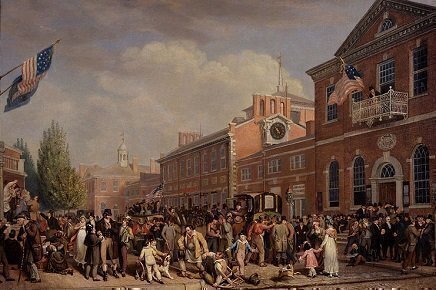Many Americans will be heading to the polls at some point today to cast ballots on the first Tuesday after the first Monday of November. So who picked that day, and why do we still observe it?

Do some people vote on other days in the fall? Here are some answers to those and other questions about Election Day.
1. Elections took place way before the Constitution was ratified
The English in particular conducted voting soon after they landed in Virginia in the 17th Century. But not everyone could vote and not every office was up for election. But many colonies allowed white male adults who owned land to vote for legislators who served in lower assemblies.
2. George Washington and Election Day drinking
In 1758, a young candidate in Virginia for the House of Burgesses footed a huge liquor bill to woo voters on Election Day. George Washington spent his entire campaign budget, 50 pounds, on 160 gallons of liquor served to 391 voters. Buying votes with booze was already a custom in England. Washington also was following a Virginia tradition where barrels of liquor were rolled to courthouse lawns and polling places on Election Day.
3. We wouldn’t recognize an Election Day about 200 years ago
Not only were eating, drinking and parading common, votes could be conducted a public voice votes. Also political parties would hand our pre-printed ballots for voters to cast, to ensure that people voted for a party ticket. It wasn’t until the 1890s that the Australian ballot, also known as the Secret Ballot, became commonly used in America.
4. The Constitution didn’t spell out when Election Day was
The administration of elections was left up to the individual states in the Constitution, with the exception of some basic requirements for presidential and congressional candidates. So states were left to pick their own election days, including when elections for federal offices were held. But any federal election involving the Electoral College needed to be resolved by mid-December.
5. The weather and farming dictated when elections were held
In the 1800s, the agrarian economy was an important factor, and farmers weren’t able to travel easily until the harvest was over. Also, the onset of winter conditions in areas that had winter conditions made travel a problem, so elections happened in the late fall.
Related Story: How midterm elections have changed Congress since 1946
6. Election Day also wasn’t on a fixed day until the mid-19th century
Congress finally stepped in to set a uniform day for presidential elections in 1845 as the first Tuesday after the first Monday in November. This was a scheme borrowed from New York state and it allowed people to observe the Sabbath, travel to vote, and return home for Wednesday, which was observed as Market Day. This was just for presidential elections every four years, but it started a trend.
7. Election voting machines are a 20th Century innovation
The mechanical lever voting machine was patented in 1889 but it took decades for the machines to become commonplace. Jacob H. Myers built the first lever machine used in an election, back in 1892. Meyers said the devices were needed to prevent “rascaldom.”
8. The mechanical voting machine is extinct
The classic mechanical lever voting machine was phased out by 2010 in the United States. Most votes are now conducted using electronic digital voting machines or by using paper ballots that are sometimes optically scanned.
9. The chance of a “hanging chad” is almost extinct, too
By 2012, punch card voting machines only accounted for 0.02% of machines in used. Back in 2000, it was a problem with the chads, or the rectangular pieces of a card punched to indicate a vote, that caused problems with the presidential vote in Florida.
10. Not all states vote on the first Tuesday after the first Monday in November
In years when federal elections aren’t held, not all states feel the need to have an election on a traditional Election Day. In 2015, Oklahoma, Rhode Island and Louisiana held elections later in the month.







